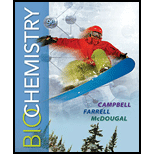
Biochemistry
9th Edition
ISBN: 9781305961135
Author: Mary K. Campbell, Shawn O. Farrell, Owen M. McDougal
Publisher: Cengage Learning
expand_more
expand_more
format_list_bulleted
Concept explainers
Textbook Question
Chapter 5, Problem 39RE
RECALL The accompanying figure is from an electrophoresis experiment using SDS–PAGE. The left lane has the following standards: bovine serum albumin (MW 66,000), ovalbumin (MW 45,000), glyceraldehyde 3-phosphate dehydrogenase (MW 36,000), carbonic anhydrase (MW 24,000), and trypsinogen (MW 20,000). The right lane is an unknown. Calculate the MW of the unknown.

Expert Solution & Answer
Trending nowThis is a popular solution!

Students have asked these similar questions
write ionization equilibrium
write the ionization equilibrium for cysteine and calculate the pi
please answer
Chapter 5 Solutions
Biochemistry
Ch. 5 - RECALL What types of homogenization techniques are...Ch. 5 - RECALL When would you choose to use a...Ch. 5 - RECALL What is meant by salting out? How does it...Ch. 5 - RECALL What differences between proteins are...Ch. 5 - RECALL How could you isolate mitochondria from...Ch. 5 - RECALL Can you separate mitochondria from...Ch. 5 - RECALL Give an example of a scenario in which you...Ch. 5 - Prob. 8RECh. 5 - REFLECT AND APPLY You are purifying a protein for...Ch. 5 - Prob. 10RE
Ch. 5 - RECALL What is the basis for the separation of...Ch. 5 - RECALL What is the order of elution of proteins on...Ch. 5 - RECALL What are two ways that a compound can be...Ch. 5 - Prob. 14RECh. 5 - RECALL Why do most people elute bound proteins...Ch. 5 - RECALL What are two types of compounds that make...Ch. 5 - RECALL Draw an example of a compound that would...Ch. 5 - RECALL How can gel-filtration chromatography be...Ch. 5 - REFLECT AND APPLY Sephadex G-75 has an exclusion...Ch. 5 - Prob. 20RECh. 5 - RECALL What is the main difference between reverse...Ch. 5 - RECALL How does HPLC differ from ion-exchange...Ch. 5 - REFLECT AND APPLY Design an experiment to purify...Ch. 5 - REFLECT AND APPLY Referring to Question 23, how...Ch. 5 - Prob. 25RECh. 5 - REFLECT AND APPLY You wish to separate and purify...Ch. 5 - REFLECT AND APPLY An amino acid mixture consisting...Ch. 5 - REFLECT AND APPLY An amino acid mixture consisting...Ch. 5 - REFLECT AND APPLY In reverse-phase HPLC, the...Ch. 5 - REFLECT AND APPLY Gel-filtration chromatography is...Ch. 5 - RECALL What physical parameters of a protein...Ch. 5 - RECALL What types of compounds make up the gels...Ch. 5 - RECALL Of the two principal polymers used in...Ch. 5 - RECALL What types of macromolecules are usually...Ch. 5 - RECALL If you had a mixture of proteins with...Ch. 5 - RECALL What does SDSPAGE stand for? What is the...Ch. 5 - RECALL How does the addition of sodium...Ch. 5 - RECALL Why is the order of separation based on...Ch. 5 - RECALL The accompanying figure is from an...Ch. 5 - Prob. 40RECh. 5 - Prob. 41RECh. 5 - Prob. 42RECh. 5 - Prob. 43RECh. 5 - REFLECT AND APPLY What would happen during an...Ch. 5 - REFLECT AND APPLY A sample of an unknown peptide...Ch. 5 - REFLECT AND APPLY A sample of a peptide of unknown...Ch. 5 - REFLECT AND APPLY You are in the process of...Ch. 5 - REFLECT AND APPLY You are in the process of...Ch. 5 - Prob. 49RECh. 5 - Prob. 50RECh. 5 - Prob. 51RECh. 5 - Prob. 52RECh. 5 - Prob. 53RECh. 5 - Prob. 54RECh. 5 - RECALL What is the basis for the technique called...Ch. 5 - Prob. 56RECh. 5 - Prob. 57RECh. 5 - RECALL What are the main procedures involved in a...Ch. 5 - RECALL Where did western blot get its name?Ch. 5 - Prob. 60RECh. 5 - Prob. 61RECh. 5 - Prob. 62RECh. 5 - Prob. 63RECh. 5 - Prob. 64RECh. 5 - Prob. 65RE
Knowledge Booster
Learn more about
Need a deep-dive on the concept behind this application? Look no further. Learn more about this topic, biochemistry and related others by exploring similar questions and additional content below.Similar questions
- f. The genetic code is given below, along with a short strand of template DNA. Write the protein segment that would form from this DNA. 5'-A-T-G-G-C-T-A-G-G-T-A-A-C-C-T-G-C-A-T-T-A-G-3' Table 4.5 The genetic code First Position Second Position (5' end) U C A G Third Position (3' end) Phe Ser Tyr Cys U Phe Ser Tyr Cys Leu Ser Stop Stop Leu Ser Stop Trp UCAG Leu Pro His Arg His Arg C Leu Pro Gln Arg Pro Leu Gin Arg Pro Leu Ser Asn Thr lle Ser Asn Thr lle Arg A Thr Lys UCAG UCAC G lle Arg Thr Lys Met Gly Asp Ala Val Gly Asp Ala Val Gly G Glu Ala UCAC Val Gly Glu Ala Val Note: This table identifies the amino acid encoded by each triplet. For example, the codon 5'-AUG-3' on mRNA specifies methionine, whereas CAU specifies histidine. UAA, UAG, and UGA are termination signals. AUG is part of the initiation signal, in addition to coding for internal methionine residues. Table 4.5 Biochemistry, Seventh Edition 2012 W. H. Freeman and Company B eviation: does it play abbreviation:arrow_forwardAnswer all of the questions please draw structures for major productarrow_forwardfor glycolysis and the citric acid cycle below, show where ATP, NADH and FADH are used or formed. Show on the diagram the points where at least three other metabolic pathways intersect with these two.arrow_forward
- answer the questions please all of them should be answeredarrow_forwardBurk plot is shown below. Calculate Km and max for this enzyme. show workarrow_forwardInsert Format Tools Extensions Help Normal text ▾ Arial C 2 10 3 + BIUA Student Guide (continued) Record data and conclusions about the mystery food sample either below or in a lab notebook. Step 2: Protein Test (Biuret Solution) Gelatin Water [Mystery Food (Positive Control) (Negative Control) Sample pink purple no change no change They mystery food sample does not contain protein because the color of the test tube wasn't pink or purple Color Conclusion They mystery food sample does not contain protein because the color of the test tube wasn't pink or purple Step 3: Lipid Test (Sudan Red Solution) Vegetable Oil Water (Positive Control) (Negative Control) Mystery Food Sample floating red no change floating red the mystery food dosnt contain lipids because the test tube has floating red 75 % 87 8 9 7 ChromeOS C Device will pow 26.battery lea powerarrow_forward
- The rate data from an enzyme catalyzed reaction with and without an inhibitor present is found in the image. Question: what is the KM and Vm and the nature of inhibitionarrow_forward1. Estimate the concentration of an enzyme within a living cell. Assume that: (a): fresh tissue is 80% water and all of it is intracellular (b): the total soluble protein represents 15% of the weight (c): all the soluble proteins are enzymes (d): the average molecular weight of the proteins is 150,000 (E): about 100 different enzymes are present please help I am lostarrow_forwardPlease helparrow_forward
- The following data were recorded for the enzyme catalyzed conversion of S -> P. Question: Estimate the Vmax and Km. What would be the rate at 2.5 and 5.0 x 10-5 M [S] ?arrow_forwardPlease helparrow_forwardThe following data were recorded for the enzyme catalyzed conversion of S -> P Question: what would the rate be at 5.0 x 10-5 M [S] and the enzyme concentration was doubled? Also, the rate given in the table is from product accumulation after 10 minuets of reaction time. Verify these rates represent a true initial rate (less than 5% turnover). Please helparrow_forward
arrow_back_ios
SEE MORE QUESTIONS
arrow_forward_ios
Recommended textbooks for you
 BiochemistryBiochemistryISBN:9781305961135Author:Mary K. Campbell, Shawn O. Farrell, Owen M. McDougalPublisher:Cengage Learning
BiochemistryBiochemistryISBN:9781305961135Author:Mary K. Campbell, Shawn O. Farrell, Owen M. McDougalPublisher:Cengage Learning

Biochemistry
Biochemistry
ISBN:9781305961135
Author:Mary K. Campbell, Shawn O. Farrell, Owen M. McDougal
Publisher:Cengage Learning
Biomolecules - Protein - Amino acids; Author: Tutorials Point (India) Ltd.;https://www.youtube.com/watch?v=ySNVPDHJ0ek;License: Standard YouTube License, CC-BY